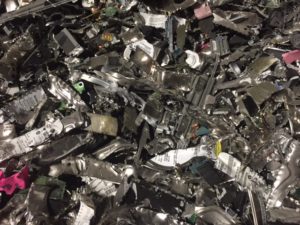Can’t I Just Shred and Recycle Waste Myself?
 You may be in the habit of shredding your bank statements, junk mail and other sensitive files in a small wastebasket shredder under your desk. Some businesses may even have a designated office employee tasked to shred the yearly purge of file boxes in the same way, sheet after sheet. It may seem like a good idea—you’re saving money by not having to hire an outside vendor to do the work. But are you sure you can trust your employees with the mundane, tedious work of shredding office files page by page? And have you ever thought about what happens to those tiny little pieces of shredded paper when you go and throw it in the recycling bin? Are they really being recycled?
You may be in the habit of shredding your bank statements, junk mail and other sensitive files in a small wastebasket shredder under your desk. Some businesses may even have a designated office employee tasked to shred the yearly purge of file boxes in the same way, sheet after sheet. It may seem like a good idea—you’re saving money by not having to hire an outside vendor to do the work. But are you sure you can trust your employees with the mundane, tedious work of shredding office files page by page? And have you ever thought about what happens to those tiny little pieces of shredded paper when you go and throw it in the recycling bin? Are they really being recycled?
The truth of the matter is that an in-house shredding operation is daunting, time consuming and expensive. It affects the bottom line by taking skilled workers away from their duties and puts them into an environment they are not trained for. Equipment is expensive and costly to maintain. And an office environment is not necessarily a safe place for your sensitive documents. The documents are placed in unlocked bins strung throughout the office awaiting the shredder where they can easily get into the hands of people who can use it to their own advantage—trash collectors, cleaning staff, even other employees.
What can do you do to protect your privacy and help the environment?
Paper is one of the most recycled commodities in the US—over 60% of paper consumed is recycled. However, the small confetti-like pieces that office shredders produce can get lost in the recycling mix. Paper, when processed in co-mingled recycling or single stream recycling operations works best with non-contaminated larger pieces of fiber. These smaller shredded pieces unfortunately cannot be recovered by the automated systems that typically recover other paper fiber. They are just too small and therefore end up getting trashed.
Companies that are certified in shredding confidential material are restricted from moving the shredded paper to other outlets. These stiff regulations and certifications require them to turn the material into pulp. Pulp is then used to make printing paper, writing paper, tissue paper, and even FDA-compliant paper products, so you can be certain that your shredded paper is being recycled. At the end of the day, outsourcing your shredding to a reputable NAID certified shredding company will save you time and money.
It’s also critical to find a resource that has both recycling and data destruction capabilities. First, it ensures your documents are kept safe. If you are shredding on-site, you are provided with locked containers in which employees can dispose both sensitive and non-sensitive information alike. This process keeps your information safe and the environment healthier.
Northeast Data Destruction offers confidential destruction services shredding sensitive paper documents and files, credit cards, CDs, backup tapes, film, computer hard drives, and more. Northeast is also a certified member of the National Association of Information Destruction, (NAID), and adheres to strict procedures and practices, assuring your confidential materials are handled with the utmost confidence and security. Contact us to ensure your documents are safely shredded and discarded.
